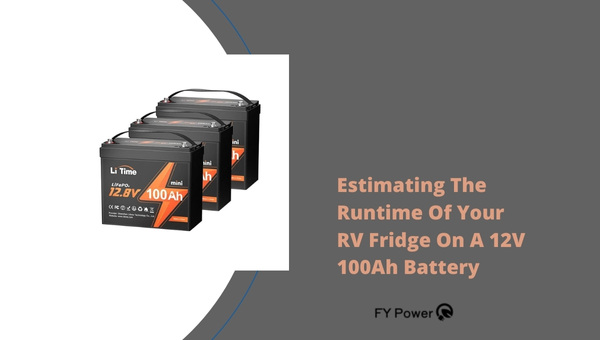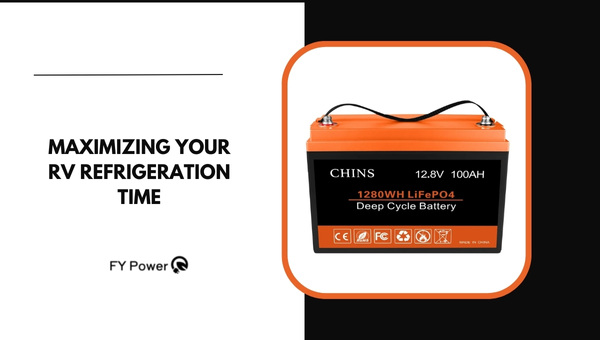When you’re planning your next RV adventure, knowing the limits of your equipment is key. Your fridge is crucial for a comfortable trip – it keeps your food fresh and your drinks cold. But that comfort hinges on one critical piece: the 12V 100Ah battery capacity.
How long can it really keep your RV fridge running? I’m here to unwrap this mystery, to make sure you’re prepared and never caught off guard!
If I could paint you a picture of the open road with no worries about spoiling groceries or warm beverages, that’s because there’s confidence in understanding battery life. Imagine not having to guess how long your food stays chilled; knowing just how much juice that 12V 100Ah battery holds for your fridge is empowering. It’s like giving adventurers peace of mind packed in a powerful energy source.
What You’ll Discover Here:
- Essential facts on battery life
- Simple guides for calculating power needs
- Impactful tips for enhancing battery longevity
- Insightful strategies to maximize fridge efficiency
Estimating The Runtime Of Your RV Fridge On A 12V 100Ah Battery
When I’m getting ready for a road trip in my RV, I often ask myself how long the fridge will keep my food cold on the journey. The heart of the matter lies in understanding how a 12V 100Ah battery works and what it can handle. Let’s dive in.

Calculating Power Draw
To figure out how much power a typical 12V RV fridge uses, you need to look at its power consumption. This is usually given in watts (W). Now imagine your fridge says it needs 50W to run – that’s like saying, “I need fifty watts every hour to do my job.”
So here’s what you do:
- Check your fridge manual or label to find the power usage.
- Multiply this by the number of hours you plan to run it:
For example: If it’s 50W, and you want to run it for 24 hours, the fridge will use 50W * 24 = 1200Wh (watt-hours).
But wait, your battery talks in terms of amps (Ah), right? So let’s convert those watt-hours to amp-hours (Ah), since our focus is on a 12V system.
Here’s the simple math:
- To get from Wh to Ah, divide by your system voltage (12V):
So, if our fridge needs 1200Wh: (1200Wh ÷ 12V = 100Ah)
That means a total draw of about 100 amp-hours from your battery.
The Role Of A Battery’s Capacity
So now we know about amps and watts. But what does that have to do with our battery lasting? It has everything to do with it!
The capacity of your battery – that big number that says “100Ah” – tells you how much electricity can be stored inside it. In simple words:
- If you have a bucket that holds up to a hundred balls (consider each ball as one amp-hour), then once you put one hundred balls in there, there is no more space left!
In real-world use:
- You have a bucket named ‘battery’.
- It can hold up to 100 amp-hours.
Knowing this can tell us roughly for how long our little electric icebox (the RV fridge) will keep humming away before we need more juice.
Here’s why:
- Say we stick with our example from earlier; if the fridge needs exactly 100Ah over twenty-four hours and your battery is rated exactly at 100Ah, then… …your trusty RV ice chest keeps cool for almost one full day! But remember, most batteries don’t like being emptied out completely, so think about using maybe only seventy or eighty percent of what’s available.
That way…
- You keep your battery happy and healthy longer.
- And say “so long” less often because who likes running out of cold drinks?
Real-life use always varies, but using these rough guides helps keep trips smooth sailing (…or should I say smooth driving!).
Also Read: Revive Candlelit Moments with DIY Solar Flameless Candle
Factors That Impact a Battery’s Effective Capacity
When talking about how long a 12V 100Ah battery can run, something like an RV fridge, it’s important to look at what affects the battery’s power. A battery might say it has a certain capacity, but different things can change how well it really works. Let’s dive into what can make the difference.
Temperature and Climate Effects
You might think that batteries work the same no matter where you are or what the weather is like, but that’s not true. The power of my 12V 100Ah battery capacity can change because of the temperature outside.
When it’s very hot or super cold, batteries don’t act the same. In chilly weather, they can get slow and won’t give out as much energy. Imagine you feel frozen; your body won’t be as quick to move around, right? It’s similar to batteries. They need to stay warm to give their best, so when it’s cold, the energy they give can go down — meaning your RV fridge might not get enough juice.
On hot days, it’s another story! Batteries might seem to work fine at first in high heat, but pushing them too hard in this weather can make them wear out way faster than expected. So, if you’re traveling through places where temperatures climb really high or dip pretty low, remember that my 12V 100Ah battery capacity could be less than what you think.
Real-world vs. Ideal Conditions
Now, let’s talk about what happens between buying a new battery and actually using it on trips. A brand new 12V 100Ah battery comes with numbers written on it – these tell you how much electrical charge (capacity) it should hold. But guess what? These numbers are based on perfect conditions that almost never happen in real life!
In ideal settings without any surprises or issues – yes – maybe my battery would perform just like its label says. But once I’m out with my RV and using different gadgets (fridge included), there are many things that could change how long my battery lasts:
- I use more energy than I realize sometimes.
- My gadgets may pull more power than their labels say.
- There could be small problems with wiring or connections.
- Even moving around with bumps and shakes from driving affects my battery life calculation.
So if someone asks me how long their RV fridge power consumption is, let them go without recharging. I must remind them: Those nice numbers don’t always match up once hit by reality!
To sum up, when figuring out real-world scenarios, we should always expect less than what our hopeful eyes see on paper or screen; nothing beats checking things yourself under your own conditions.
In short, understanding these factors is key when thinking about maintaining reliable power in one’s recreational vehicle for tasty treats and keeping cool!
Also Read: Solar USB Charging: Build Your Own in 7 Easy Steps
Maximizing Your RV Refrigeration Time
When I’m out and about with my RV, keeping my food cool is a big deal. Here’s what I do to make the most out of my small fridge without asking too much from my 12V 100Ah battery capacity.

Energy Efficient Practices
To keep things running smoothly, I’ve learned a couple of tricks:
Plan Ahead: Before going on any trip, I plan my meals. This way, I pack only what’s necessary and avoid opening the fridge too often.
Pre-cool Your Fridge: Turning on the refrigerator a day before loading it up helps. It gets cold enough so when I put in the food, it doesn’t need extra power to cool down from scratch.
Keep It Full… But Not Too Full: A fridge packed with items stays cold easier, but overfilling means less air circulation and more work for the battery. So, finding that sweet spot is key.
Chill Your Food First: Adding already cooled items takes off pressure from your fridge to do all the hard work. Always chill things before they go into the RV fridge.
Use Insulation Covers: They’re like blankets for fridges! Pop one over, and suddenly, less heat messes with your appliance, meaning less battery drain.
Avoid Direct Sunlight: If your fridge or RV bakes in direct sunlight, guess who has to work overtime? It’s not just me slapping on sunscreen but also my poor fridge trying not to turn into an oven.
Auxiliary Power Solutions
Keeping that 12V 100Ah battery capacity charged up gives me peace of mind when traveling.
Here’s how I boost power without stressing over outlets:
Solar Panels: Harnessing sunlight does wonders! Mounting these babies on top of my RV gives me free energy during sunny days, which goes straight into charging up my system.
Dual Battery Setup: Another cool thing is having two batteries instead of one. While one kicks back, or rather works hard, powering stuff up, its buddy gets charged and rested for its turn.
Portable Generators: When sunlight gets shy or runs away (basically on cloudy days), a portable generator backs me up without having wires strewn across campsites.
Using smart strategies and helpful gadgets can keep your road-trip meals chilled without sucking your 12V 100Ah battery capacity dry. Now, you can turn those dreams of off-grid living into full-on reality with fridges chilling like they should!
And let’s be honest – nothing beats grabbing an ice-cold drink after setting up camp under the stars… especially when you know there’s plenty of juice left in that battery thanks to these hacks!
Also Read: Which generator is required to run a refrigerator?
Maintaining Your Battery For Optimal Performance
When it comes to maintaining a 12V 100Ah battery, there are some simple steps you can take to keep it working great. This is best if you’re using your battery for something important, like a fridge in your RV. A well-cared-for battery will not only last longer but can save you money, too.
Regular Maintenance Tips
How can proper care and maintenance prolong the ’12V 100Ah battery capacity’ longevity?
Here’s what you need to do:
- Check the Charge: Always make sure your battery isn’t going too low on charge. For long-lasting power, charge it regularly without letting it die completely.
- Keep It Clean: Dirt and corrosion can mess with your battery’s connections. Wipe down the terminals with a cloth now and then. If there’s any rust or dust, clean it off carefully.
- Stay Cool: Batteries don’t like being too hot. Find a cool spot for your battery where it won’t get direct sunlight.
- Secure It Tight: Make sure your battery is sitting snug in its place. If it moves around when you’re driving, that could hurt the battery and cut its life short.
- Regular Check-Ups: Like going to a doctor, bring your battery in for professional check-ups once in a while.
- Use Wisely: Don’t push your battery life calculation limits by making the fridge work harder than needed – keep that lid closed as much as possible!
Following these tips should make sure that ’12V 100Ah battery capacity stays strong, which means less worrying about food going bad on road trips!
Conclusion
After diving deep into how a 12V 100Ah battery works and operates an RV fridge, I hope you feel more informed. Knowing exactly how long your fridge will run is tricky, as many factors come into play — from the power consumption of the fridge to the conditions under which you’re operating your rig.
Remember that maintaining your battery and following energy-efficient practices can significantly help in extending its life and efficiency.
Key Takeaway Points
- Calculating the power draw of your RV fridge is crucial for understanding battery usage.
- The ’12V 100Ah battery capacity’ plays a significant role in determining refrigerator runtime.
- Temperature, climate, and real-world conditions significantly impact battery effectiveness.
- Embracing energy efficiency and integrating auxiliary power solutions can enhance overall performance.
- Regular maintenance is essential for preserving ’12V 100Ah battery capacity’ longevity.

